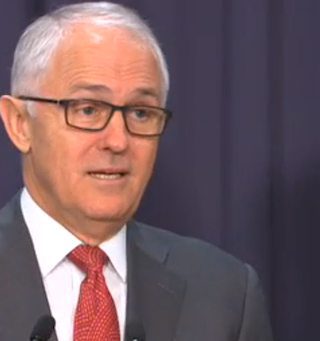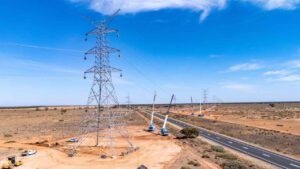Prime minister Malcolm Turnbull “eyeballed” the heads of Australia’s biggest retailers over the scale of consumer bills on Wednesday and would like you to believe that they blinked.
Truth be told it was more of a knowing wink than a blink, and it is likely that all Turnbull achieved is to kill the size of discounts available to smart consumers. There is not a snowflake’s chance in hell (or a coal boiler) that the big utilities are taking a haircut on this.
The fundamental problem – the high price of electricity – remains unaddressed because the Coalition will not deal with issues such as long term energy policy, or the legal rorting of wholesale markets by an oligopoly of generators, some of them the same mob that turned up to look concerned and contrite in Canberra.
The heads of AGL Energy, Origin Energy and EnergyAustralia, and five other leading retailers along with their lobby group, met with Turnbull, federal Treasurer Scott Morrison and energy minister Josh Frydenberg, to discuss retail market practices that have padded company profits at the expense of consumers.
Energy prices are high right now because we need more supply in the market. Looking fwd to working on solutions with gov and industry today
— Andy Vesey (@AndyVesey_AGL) August 8, 2017
Top of the agenda were concerns that millions of Australian households were on electricity plans that were costing them “hundreds of dollars” – and potentially thousands – a year more than they needed to pay, due to a combination of customer confusion and inertia.
What was agreed fell a long way short of the sort of regulation vaguely mooted by the government, flagged by the head of the Australian Energy Market Operator, and promoted by the Greens.
Confusion is profit, as we reminded readers last week, and it appears to have finally sunk in with the government, once they had paused their relentless attack on renewables and battery storage.
“Complexity and inertia are the big energy company’s friend,” Morrison told reporters after the meeting. “We’re ensuring that there is less complexity, and working on this inertia issue,” he said.
“What we want to put in place is the ability of consumers to have an informed choice,” Turnbull said. “Many households and consumers are paying hundreds of dollars more, right now, than they need to.
“The biggest (bill) discount doesn’t necessarily mean the best deal… It’s that level of complexity that customers are not aware of, and they are effectively getting short-changed.”
The PM said the energy CEOs had agreed at the meeting to write to all customers who had reached end of a plan, and outline “in plain English” what new plans were available to them, and what it would cost them if they took no action.
“They will be required to write to you and say: ‘you are coming to the end of this plan, if you don’t do anything you will go back onto the standard rate, and it will increase your bill by x dollars,” Turnbull said.
“There will be clear disclosure at the end of a discount period, of the dollar impact if they take no action.”
Many energy experts say that is what the retailers are supposed to be doing already, at least in some jurisdictions, but are clearly not.
“The problem is they already notify customers of tariff changes and it isn’t working,” says Tristan Edis, senior analyst at Green Energy markets. “The sad thing is that the PM only had to push the reforms slightly further to make a world of difference.” Edis explains why in further detail in this article here.
Morrison said the changes would put millions of Australians – and namely those 1 million-plus currently on standing offer arrangements with their retailer – in a position to get a better deal on electricity prices.
He’s kidding himself. Adrian Merrick, a former senior executive at EnergyAustralia and founder of the feisty upstart Energy Locals, says the agreement struck misses the point: the big retailers will continue to extra healthy premiums for consumers and prices are too high to start with.
“The big retailers will be high fiving each other in the Qantas lounge at Canberra airport today,” Merrick says.
“These requests from the PM will do absolutely nothing to lower customer bills or the associated confusion and disgust with the market. The government would be well advised to ask former industry insiders to devise a plan that will actually force the right type of action from retailers.”
Merrick says the utilities can simply respond by increasing the headline price, even while a percentage discount remains the same. This increases the size of a customer’s bill. Or the discount can be gently eroded over time until it reaches the point where is no need to offer better value alternatives.
“We find it disgusting that in an area that is already misleading, confusing and deceptive, more focus is placed on the size of an apparent discount,” Merrick says.
“Instead of lowering the key components of higher prices, including wholesale costs and network charges, customers are led to focus on an area that already causes them to pay more than they should”.
Merrick says oversight of energy margins is also critical and was missed at the meeting. Large energy companies profit from both retailing and power generation. Profit can be shifted between the different parts of the business to present the right external picture.
He cited one recent example where one retailer said to be offering a new and substantial discount to customers, had actually increased its standing offer by nearly 10 per cent, or around $175 per year so that it can offer a higher percentage discount.
“This practice is simply unethical, deceptive and reveals a core problem with the market that will not be addressed by nice chats in Canberra. Retailers that can’t operate ethically should be suspended from selling to new customers until they can re-build the trust of the regulators and consumers.”
Nevertheless, energy minister Josh Frydenberg said that a “very significant and substantive” set of reforms had come out of the “very frank discussion” between the government and the power companies.
“As a result of the commitments made today, you will see families being alerted to the fact that they are paying more than they need to for electricity. And that will happen now,” he said.
Turnbull didn’t manage to keep party politics out of the equation, telling reporters that some of the “most rapacious companies” in Australia had been the retailers owned by the Queensland government, who were “gaming the system to maximise profit.”
Anyone who has seen the practices of dominant generators in South Australia, and in NSW over the summer period, know that to be a lot of cobblers. It is rampant across the market, hence the push for the change from the 30-minute settlement to a 5-minute settlement.
The one thing that the Queensland government directive to generators to change their bidding behaviour did show was the power of regulation and direct intervention. Queensland has gone from having the equal highest wholesale prices over the last five years to the lowest in the last five months.
Federal Labor quickly seized the opportunity to bite back, with shadow energy minister Mark Butler warning that “another talkfest where Malcolm Turnbull wags his finger sternly at big energy companies is simply not going to cut the mustard.
“Australian households and businesses need real action. Now if change comes from this morning’s meeting that delivers a better deal for Australian consumers then Labor will welcome that change. But the proof in the pudding … will be when Australians come to open their power bills in coming weeks and months and discover whether they have come down or whether they are going to continue to spiral up, and up, and up.”
The energy bosses, in turn, were keen to point out that not all of the energy market’s ills were of their companies’ doing.
“Let’s be clear,” said Origin CEO Frank Calabria, in a statement after the meeting, “to deliver a genuine reduction in prices for Australians we must also find a way through on energy policy, including a Clean Energy Target.
“This is necessary to unlock investment in much needed new supply to replace our ageing coal-fired power stations, and transition us to a cleaner, more modern energy system,” Calabria said.
And in Tweets before the meeting, AGL chief Andy Vesey, said that while he agreed that energy affordability was a subject that required “urgent intention,” Australia’s energy prices were high right now “because we need more supply in the market.”








